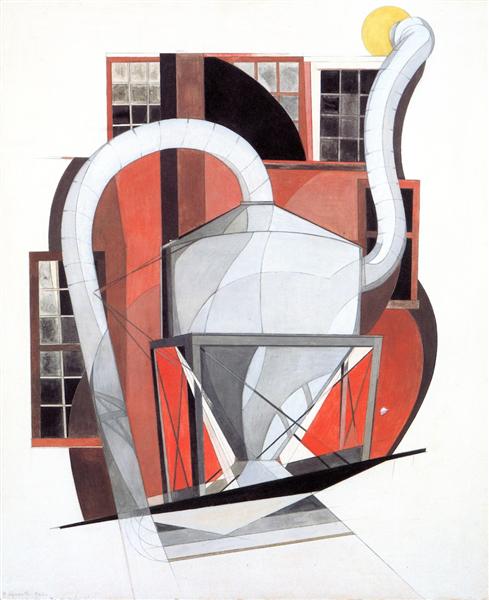Description
The work machinery - 1920 by Charles Demuth stands as a fascinating exponent of American modernism, a movement that flourished in the first decades of the twentieth century and was characterized by its search for new forms and approaches to represent contemporary reality. In this painting, Demuth, acclaimed by his mastery in the use of watercolor and oil painting, presents an elaborate study of the role of machinery in modern life, an issue that deeply resonated with the growing industrialization of American society at that time.
The machinery composition - 1920 reveals a domain in the arrangement of the elements, where geometric shapes and soft lines are intertwined by creating a visual dialogue between the parts and the whole. The work captures the intricate network of gears, pulleys and metal structures, elements that seem to come alive through the require of demuth. Each component is carefully oriented to emphasize both its individual function and its interrelation within the industrial system. This work not only reflects Demuth's fascination for technology, but also raises questions about the place of the human being in a world dominated by the machine.
As for the chromatic palette, Demy uses a combination of off -maths and vibrant nuances that infuse paint with energy and dynamism. The blue and gray predominate, evoking the coldness of the metal and the functionality of the machines, while the accents in warm colors, such as orange and red, provide a contrast that suggests movement and activity. This use of color is not merely decorative, but also contributes to the creation of an atmosphere that reflects both the admiration and the alienation that technology can generate in the human being.
Unlike many of his other works, machinery - 1920 dispenses with explicit human figures, an element that could be interpreted as a comment on dehumanization that industrialization can lead to. Without characters that interact with the machines, the viewer faces directly the essence of the devices represented, becoming an observer distant from a world that advances at high speed, leaving behind the individuality and connection between people.
Demuth was part of the artistic movement known as "precisionism", which sought an objective and clear representation of modernity and its advances. Influenced by European movements such as Cubism and Futurism, his work is characterized by severe stylization and detail attention. Machinery - 1920 is a paradigmatic manifestation of these principles, where the form is reduced to its industrial essence, reflecting a world in transformation.
The legacy of Demuth and his exploration of the machinery resonates in contemporary works and in the way in which current artists address the conflict between technology and human experience. The painting becomes a testimony of a moment in time where the progress and implementation of the machine are presented not only as achievements, but also as dilemmas inherent to modernity. In this sense, machinery - 1920 remains in force, inviting the viewer to reflect on the relationship between man and the machine in our modern society.
KUADROS ©, a famous paint on your wall.
Reproductions of paintings handmade oil, with the quality of professional artists and the distinctive seal of KUADROS ©.
Art reproduction service with satisfaction guarantee. If you are not completely satisfied with the replica of your painting, we refund your money 100%.

